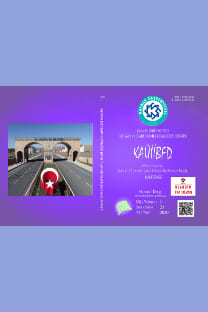SOSYAL ZEKÂNIN KARAR VERME STİLİNE OLAN ETKİSİNDE BİLİŞSEL ESNEKLİĞİN DÜZENLEYİCİ ROLÜ
Sosyal Zeka, Karar Verme Stili, Bilişsel Esneklik
MODERATING ROLE OF COGNITIVE FLEXIBILITY IN THE EFFECT OF SOCIAL INTELLIGENCE ON DECISION-MAKING STYLE
___
- Altay, Ü. (2011). Yöneticilerin duygusal zekâ düzeylerinin karar verme stillerine etkisi ve bir araştırma. İstanbul: İstanbul Üniversitesi Sosyal Bilimler Enstitüsü, Yüksek Lisans Tezi.
- Altunkol, F. (2017). Bilişsel esneklik eğitim programının lise öğrencilerinin bilişsel esneklik ile algılanan stres düzeylerine ve stresle başa çıkma tarzlarına etkisi. Çukurova Üniversitesi, Sosyal Bilimler Enstitüsü, Adana.
- Azuma, R., Daily, M. & Furmanski, C. (2006, March). A review of time critical decision-making models and human cognitive processes. In 2006 IEEE Aerospace Conference (pp. 9-pp). IEEE.
- Badak A. (2019). Pozitif psikolojik sermaye, bilişsel esneklik, psikolojik güvenlik ve çalışan performansı arasındaki ilişkiler. Doktora Tezi. İstanbul Arel Üniversitesi Sosyal Bilimler Enstitüsü.
- Beckmann, J. F. (2014). The umbrella that is too wide and yet too small: why dynamic testing has still not delivered on the promise that was never made. J. Cogn. Educ. Psychol. 13, 308–323. Campitelli, G., & Gobet, F. (2010). Herbert Simon's decision-making approach: Investigation of cognitive processes in experts. Review of General Psychology, 14(4), 354-364.
- Cañas, J. J. Quesada, J. F., Antolí, A. & Fajardo, I. (2003). Cognitive flexibility and adaptability to environmental changes in dynamic complex problem-solving tasks. Ergonomics, 46 (5), 482-501.
- ISSN: 1309-4289
- Yayın Aralığı: Yılda 2 Sayı
- Başlangıç: 2010
- Yayıncı: Kafkas Üniversitesi, İktisadi ve İdari Bilimler Fakültesi
SOSYOTROPİK-OTONOM KİŞİLİK ÖZELLİKLERİNİN BİLGİ İFŞASINA ETKİSİNDE ETİK İŞ İKLİMİ ALGISININ ROLÜ
A RESEARCH ON THE EFFECT OF INDIVIDUAL VALUES ON SELF-LEADERSHIP BEHAVIOR
Sevcan PINAR, Olcay Bige AŞKUN
İŞTEN ÇIKARILANLARA DESTEK HİZMETİ (OUTPLACEMENT) ÜZERİNE NİTEL BİR ARAŞTIRMA
Zeynep Sinem NALBANTOĞLU, Esin ERTEMSİR, Derya ÇELİK, Özge KOBAK
FARKLILIKLARIN ETKİLEŞİMİNDEN KAYNAKLANAN“KENAR ETKİSİNİN” ÖRGÜTSEL YENİLİKÇİLİĞE KATKISI
BİLİNÇLİ FARKINDALIĞIN BİLİŞSEL KAYIPLAR ÜZERİNDEKİ ETKİSİ: ÖZNEL İYİ OLUŞUN ARACILIK ROLÜ
Hande ÜNÜVAR, Sema POLATCI, Hüseyin YILMAZ
THE ROLE OF SOCIAL NETWORKS IN FOREIGN DIRECT INVESTMENTS: THE CASE OF TURKISH BUSINESS GROUPS
YÖNETİM YAZININDA PORTER HİPOTEZİNİNBİBLİYOMETRİK ANALİZİ
AMİRİM BENİ HASTA EDEBİLİR Mİ? İSTİSMARCI YÖNETİMİN ÇALIŞANIN SAĞLIĞI ÜZERİNDEKİ ETKİLERİ
